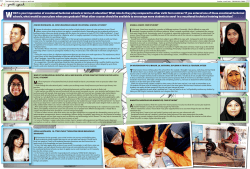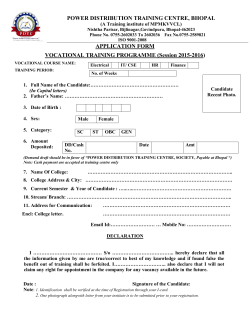
Weekly Media Review of Hungarian Communities Abroad
Weekly Media Review of Hungarian Communities Abroad 12/2015 Agreement on Hungarian vocational education in Vojvodina is concluded Hungary – Magyarország Representatives from Hungary’s Prime Minister’s Office, Ministry of Agriculture and Ministry for National Economy and from Vojvodina’s Hungarian National Council have concluded an agreement in Magyarkanizsa/Kanjižaon on the development of Hungarian-language vocational education in Vojvodina. Under the program entitled “2015 – the year of Hungarian vocational education abroad”, the parties discussed opportunities for vocational training in Vojvodina. State Secretary for Hungarian communities abroad Árpád János Potápi said that the main purpose of the agreement is to draw attention to the importance of vocational education. The state secretary added that migration can be considered the most urgent problem today, and effective solutions must be urgently found. He said that “The strengthening of the Hungarian community in regions inhabited by Hungarians is the primary aim today, and the restructuring of vocational education can be a basis for this economic reinforcement.” Mr. Potápi emphasized that in order to help Hungarians prosper in their homeland, thriving Hungarian economies must be established, and appropriate vocational education is an essential precondition for this. Cluster for support of Hungarian vocational training abroad is established in Kecskemét The founding document of the Duna Region Vocational Education Cluster – which supports Hungarian-language vocational and adult education abroad – has been signed in Kecskemét. Deputy State Secretary for Vocational and Adult Education at the Ministry for National Economy László Odrobina said that the members of the cluster include vocational education institutions in Hungary and abroad, civil organizations and county municipalities, as well as the Hungarian state. Ministerial Commissioner at the State Secretariat for Hungarian Communities Abroad István Grezsa said that in order to foster Hungarians’ prosperity in their homeland, the Hungarian government helps young Hungarian people living abroad to acquire deep professional knowledge which will strengthen local economies. The document on the founding of the cluster was signed by almost twenty organizations, including vocational, adult and higher educational institutions, professional bodies, civil society organizations and local governments. Regarding regions outside Hungary, the document was signed by representatives from Vojvodina, Transylvania, Transcarpathia and Slovakia. Unsatisfactory answer from the Romanian president concerning Transylvania’s autonomy The Office of the Romanian president Klaus Iohannis has not given a satisfactory answer to the petition demanding territorial, administrative and economic autonomy for Transylvania, which was submitted by an activist of the Autonomy for Transylvania movement Ernő Fancsali, and signed by 14,700 supporters. The official 2 Transylvania – Erdély response noted by one of the President’s advisors cites several articles of the Romanian Constitution. According to one of the cited articles “Romania is a sovereign, independent, unified and indivisible nation state”, while another article declares that “Romania is the indivisible common home of all of its citizens, regardless of their race, nationality, ethnic origin, language, religion, gender, opinion and political affiliation, wealth or social origin.” Ernő Fancsali said that the President’s advisor – assuming that he had read the petition – cannot differentiate either between the concept of autonomy and independence, or between ethnic and economic autonomy. Signatures in support of the petition urging the autonomy of Transylvania were collected on the internet. Earlier Mr. Fancsali said that the document was signed by as many Romanians as Hungarians. New law on decentralization is completed Romania’s new draft law on decentralization has been completed. On Thursday the country’s Minister for National Development Liviu Dragnea forwarded the document to the President, the ministries, the Parliament and local authorities. Mr. Dragnea said he hoped that the decentralization will be realized next year, adding that the President of Romania Klaus Iohannis continues to support it, although he had not yet given a response to the document. According to press commentaries, the Government’s new law on decentralization would expand the remit of county and local municipalities. The Minister for National Development added that in the coming period he would wait for the responses of local authorities and ministries, and the draft law is planned to be finalized by the end of the year, and implemented next year. Hunor Kelemen will have no challenger Secretary General of the Democratic Alliance of Hungarians in Romania (RMDSZ) Péter Kovács has announced that the current president of the alliance Hunor Kelemen will have no challengers in the RMDSZ congress scheduled to take place in the middle of April. By last Wednesday’s deadline, Mr. Kelemen was the only person who had been nominated for the position of president of the alliance. The secretary general added that Mr. Kelemen had been nominated by 12 regional organizations of the party, and he accepted the nomination in writing. Robert Kaliňák: we still have to wait for the new law on citizenship In February independent member of the Slovak parliament Edit Pfundtner sent an interpellation to Slovakia’s Minister of Interior Robert Kaliňák in connection with the ministerial decree on citizenship, which states that those who were deprived of their Slovak citizenship as a result of acquiring the citizenship of another country can apply for the restoration of their Slovak citizenship. In her interpellation, Ms. Pfundtner stressed that the ministerial decree will not improve the situation of Hungarians living in Slovakia, since it makes the restoration of citizenship dependent on having 3 Slovakia – Felvidék permanent residency abroad. In his response, the minister said that the “ministerial decree on the restoration of Slovak citizenship is only a kind of palliative, and we still have to wait for the new law.” He added that the decree is in full accordance with Slovakia’s Act on Citizenship and the country’s international commitments. The minister highlighted that the issue of citizenship is “an extremely sensitive problem”, therefore, its specialist evaluation and the preparation of an amendment to the current Act takes a long time. József Berényi: several items of the Slovak-Hungarian basic treaty should be reviewed Transcarpathia – Kárpátalja On the 20th anniversary of the signing of the basic treaty between Hungary and Slovakia, Hungary’s Ministry of Foreign Affairs and Trade declared that the treaty serves the cooperation between the two countries well. On its website, Slovakia’s Ministry of Foreign Affairs also issued a statement with similar content, commemorating the anniversary of the signing of the treaty. In connection with the anniversary, the head of the Party of the Hungarian Community (MKP) József Berényi said on Saturday that several items of the treaty should be reviewed. Mr. Berényi said that one of these items is Article 15, which states that the parties will avoid all kinds of policy and practice which enhance assimilation, and will defend the members of national minorities from actions aimed at the enhancement of assimilation. The head of the MKP added that “On the basis of the data of the last census, we can declare that these items have not been fulfilled, since assimilation among Hungarians living in Slovakia is strong. We should examine what the reason for this assimilation is, and how the two countries intend to handle it.” Mr. Berényi added that a further point of the treaty which should be reviewed is the one which declares that the parties will refrain from measures which change the rate of the population in regions inhabited by national minorities, in this way limiting human rights and freedoms. Questions affecting Transcarpathian Hungarians are discussed in Kiev On the initiative of Ukraine’s committee responsible for human rights, national minorities and international relations, parliamentary hearings entitled “The role, significance and effect of civil society on the formation of the uniformity of national policy in Ukraine” were held in Kiev on 11 March. Representatives of the Hungarian community of Transcarpathia included the head of the Cultural Association of Hungarians in Transcarpathia (KMKSZ) László Brenzovics. Speaking at the event, Mr. Brenzovics stressed that the legitimate demands of minorities are not being properly met in the current difficult economic situation. Mr. Brenzovics emphasized that Ukraine needs aid instead of loans from the International Monetary Fund (IMF), adding that in order to survive this crisis, a considerably higher number of rights and freedoms should be guaranteed. The head of the KMKSZ highlighted that solutions to the problems affecting national minorities should be found as soon as possible, as 4 well as to the question of how national minorities could take part in the formation of Ukraine’s politics. 5
© Copyright 2025











